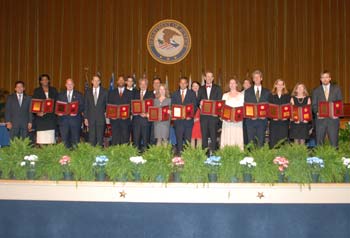
The McWane trial team that received the Attorney General's 2006 John Marshall Award, one of the Justice Department's highest honors. The lawyers cited: Kevin M. Cassidy, Christopher J. Costantini, Daniel W. Dooher, Andrew D. Goldsmith, Deborah L. Harris, Leshia M. Lee-Dixon, Ralph J. Marra Jr., Norv McAndrew, Noreen E. McCarthy, Richard A. Poole, Robert O. Posey, Arnold A. Spencer, Andrea T. Steward and H. Claire Whitney.
Beginning with its prosecutions of McWane, the federal government adopted an innovative strategy to deal with serial violators of environmental and worker-safety laws. The initiative would focus on companies which, in the course of violating environmental law, also endangered their workers.
The resulting program, called the Worker Endangerment Initiative (WEI), pairs prosecutors from the Environmental Crimes Section of the Department of Justice with investigators from the Occupational Safety and Health Administration (OSHA) and the Environmental Protection Agency (EPA).
The Environmental Crimes Section, which prosecutes WEI cases, is part of the Justice Department's Environment and Natural Resources Division (ENRD). The 40-person section works closely with criminal investigators for the Environmental Protection Agency (EPA), the FBI and the 93 U.S. attorneys' offices around the country. The WEI also established special training programs for OSHA inspectors to teach them the rudiments of criminal investigation.
"Many times we find that companies that are indifferent to their environmental obligations are equally indifferent to other things that help keep workers safe," says Ronald Tenpas, assistant attorney general in charge of ENRD.
Building on the McWane prosecutions, the initiative has led to several notable cases.
In 2005 and 2006, a federal grand jury in Missoula, Mont., indicted W.R. Grace along with seven current and former Grace executives for conspiring to release asbestos into the air, "placing persons in imminent danger of death or serious bodily injury," "knowing endangerment" under the Clean Air Act, and obstruction of justice.
Even before a trial could begin, the parties were locked in a series of lengthy legal challenges over the nature of the charges. In 2007 a federal appeals court sided with the government, restoring the criminal charges of "knowing endangerment," a felony under the Clean Air Act. No date has yet been set for the trial. In a statement on its Web site, the company has "categorically" denied the charges.
Also in 2005, Motiva Enterprises, a joint venture of Shell Oil Company and a subsidiary of the Saudi government's national oil company, pleaded guilty to negligently endangering workers at an explosion in Delaware City, Del., facilities in July 2001. The blast killed one worker, Jeffrey Davis, and injured eight others. The company also pleaded guilty to allowing some 99,000 gallons of sulfuric acid to drain into the Delaware River after the explosion and negligently releasing sulfuric acid into the air.
The company was fined $10 million for a criminal violation of the Clean Air Act, paid a $12 million civil penalty for violations of other federal and state environmental laws, and more than $35 million to settle with Davis' family.
In October 2007, a subsidiary of British Petroleum (BP) pleaded guilty to a one-count felony violation of the Clean Air Act for a March 2005 explosion at a Texas oil refinery that killed 15 workers and injured more than 170 others. The company agreed to pay a record fine of $50 million under the Clean Air Act. According to a BP spokesman, the company has also paid more than a $1.6 billion dollars in civil settlements to families of the victims thus far, with hundreds of claims outstanding.
As for the McWane prosecutions, in 2006, the 14-person trial team received the Attorney General's John Marshall Award, one of the Justice Department's highest honors, for "their hard work on a nationally coordinated series of prosecutions that served to bring to justice one of the nation's most egregious violators of environmental and worker-safety laws."
